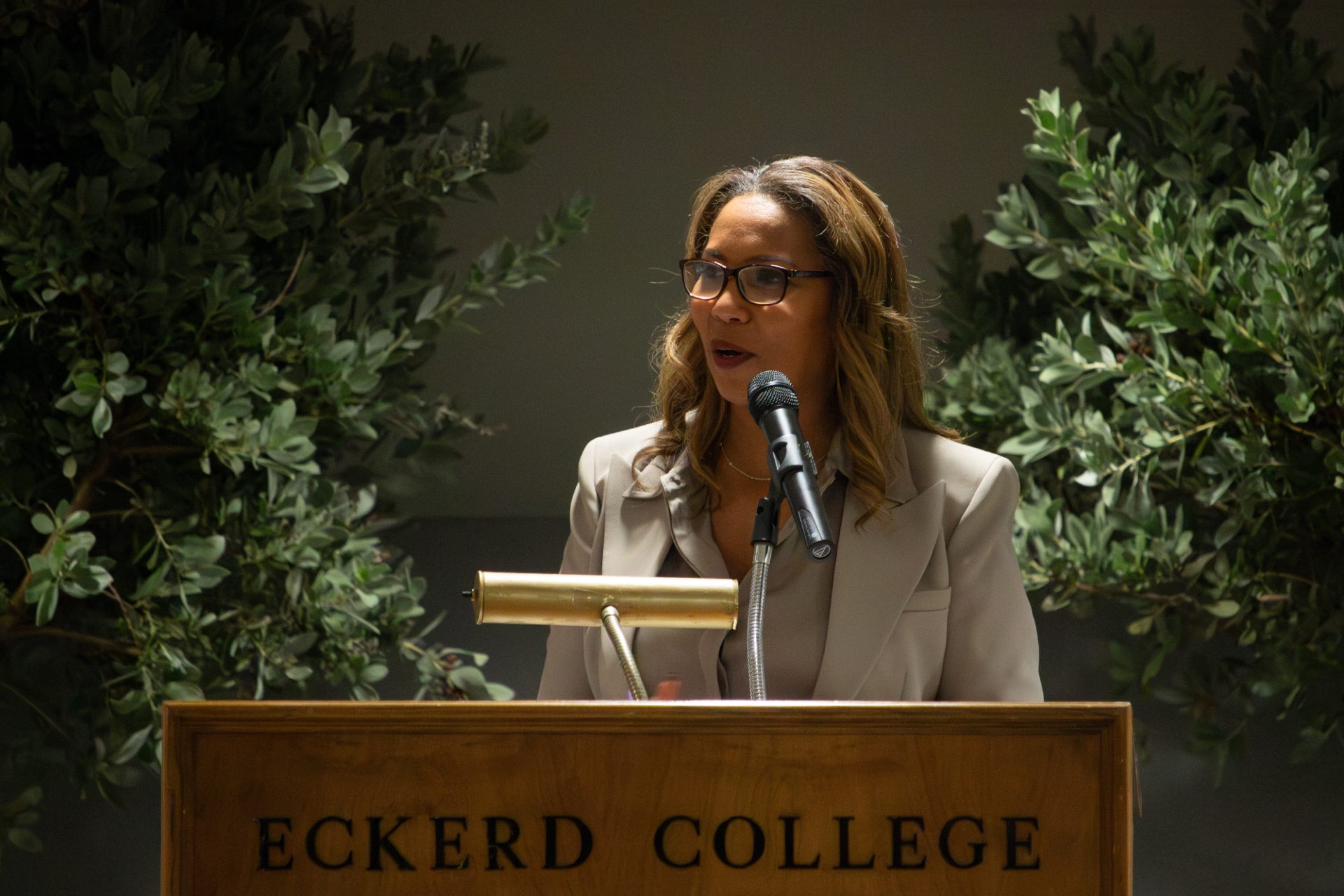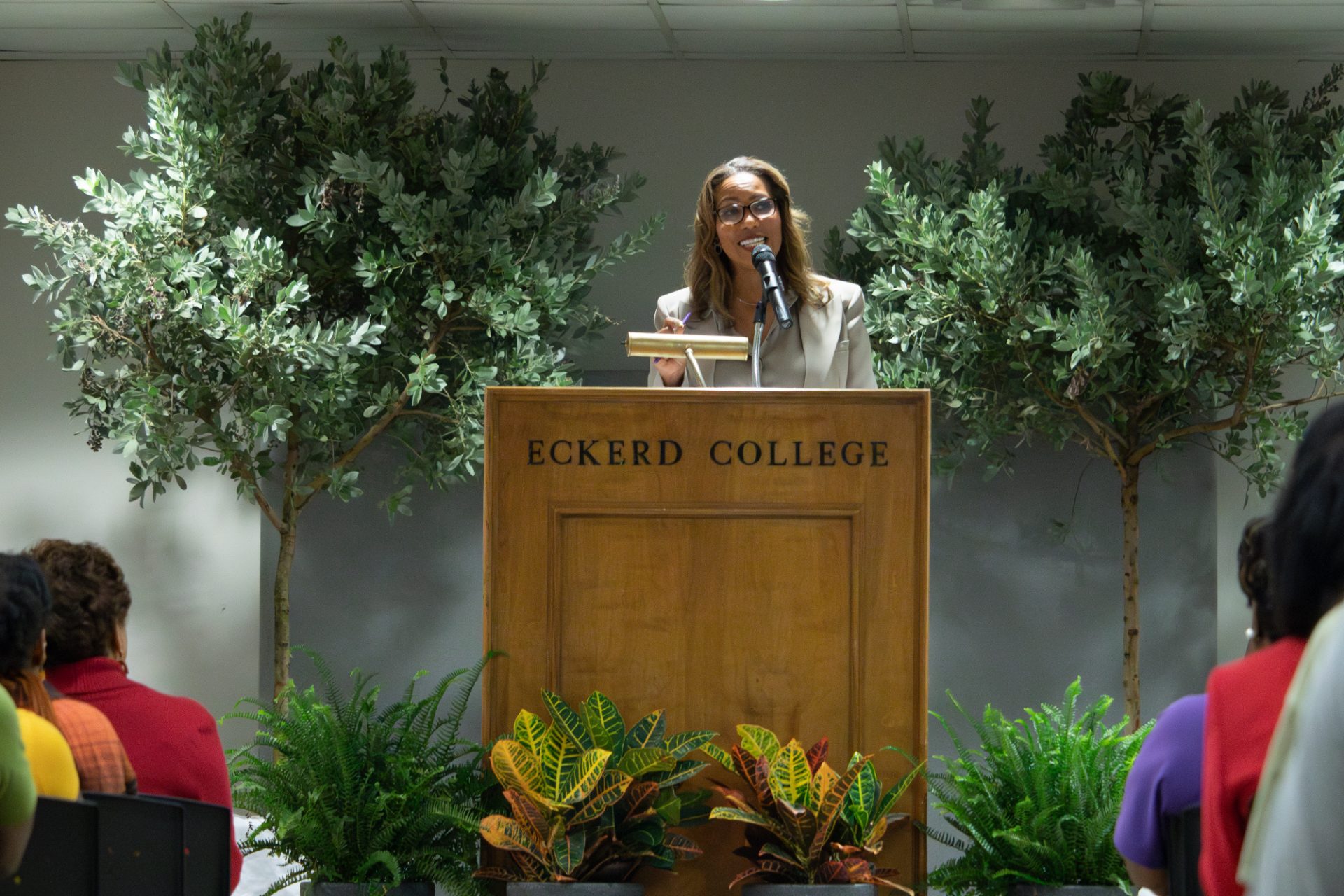A room full of students, faculty, staff and friends in Eckerd College’s Fox Hall listened actively to a remarkable woman whose words were chosen to stick with the audience forever.
Roslyn Clark Artis, J.D., Ed.D., the president of Benedict College—a historically Black college in South Carolina—had knocked down multiple hurdles and made the path smoother for generations to come. She used the story of her illustrious career to empower Eckerd’s students during her presentation “Finding Our Voices—Your Leadership Language” on Nov. 9, the official kickoff event to the first EC Classic men’s basketball tournament featuring Eckerd, Benedict, Allen University and the University of Tampa.
Made possible through a collaboration among the Student Life, Athletics and Admission offices, EC Classic Weekend featured campus tours, a tailgate, basketball games and a student-requested keynote speech from Artis.
“There had been this constant conversation with students [from marginalized groups] who wanted to have speakers come in from the community who could really speak to them and pour into them,” said Ann Sherman-White ’06, Eckerd’s coordinator of inclusive student engagement and the event’s architect. “I had heard so much about Dr. Artis as a speaker, educator and college president, so I knew she would be the perfect speaker for this event.”
Artis had started her career practicing law, before transitioning to teaching, earning a Doctorate of Education. In 2013, she became the first woman president of Florida Memorial College, and later, in 2017, she transitioned to Benedict College, becoming the first woman president again.

Artis encouraged students to use their time at Eckerd College to find their voices.
Artis said she is a conversationalist now because she didn’t always have a voice.
One day, Artis’s fourth grade teacher in homogenous West Virginia asked a simple question: “What do you want to be when you grow up?” Young Artis stood up and proclaimed she would be a lawyer. The class laughed. No one defended her. No one stood up for her. And when Artis sat down, she decided from that day forward, she would find her voice.
Chasing her dream, Artis would later make it into West Virginia State University, which, unbeknownst to her, was a historically Black college. “I didn’t have the voice or the language to even know where I was,” she recalled. For the first time, she was surrounded by people who understood her. “I arrived on this alternate universe that is an HBCU campus, only to discover what it is to be Black in a country that does not always see you or give you a voice,” she explained.
Words hold power, and we must use them effectively and inclusively, Artis stated. Gendered language, racial language, and sexualized language are everywhere in our world. Artis believes it isn’t all the same; it matters. “Language defines, determines and amplifies leadership—or the perceived lack thereof.”
Language is more than just communication, she pointed out. It reflects how the world is viewed and reinforces stereotypes. If we confronted this language, we would create an inclusive environment that empowers everyone.
Artis elaborated that our words can reinforce societal norms, but they can also challenge them. By changing language, we can dethrone the norms that hold back people from marginalized groups and give a voice to everyone. Gendered language illuminates biases that create boundaries.
“Our desire [as educators] is that you be healthy and whole,” Artis said. “The best version of yourself.”
Ending the lecture, Artis shared her hope and enthusiasm for the students of Eckerd College: “If you leave here without a voice … You have failed us all. And I am not looking at a room full of failures right now. I can feel that on this campus. This is not a failing campus, and these are not failing students. These are the faces of the future.”













